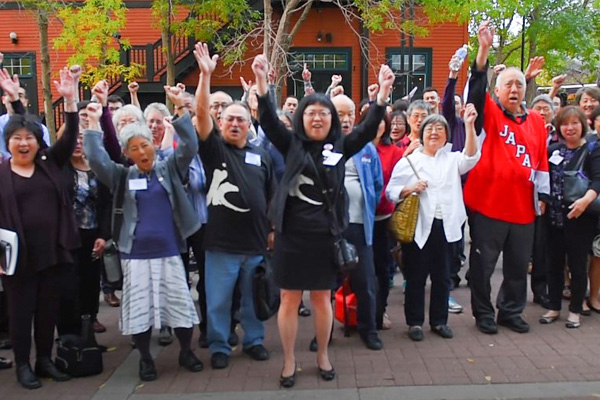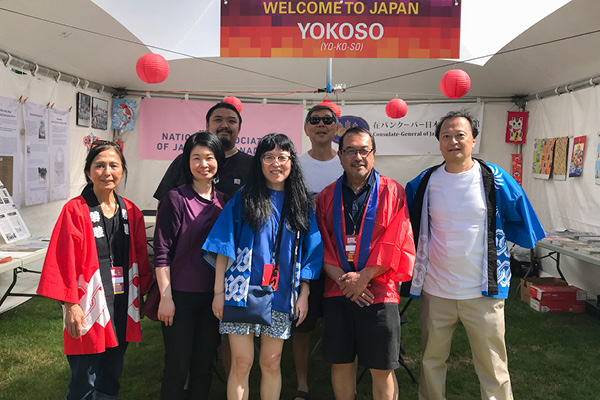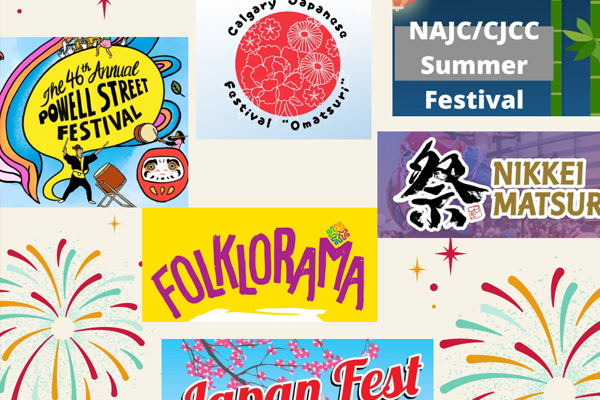 I first heard the hauntingly iconic song, Watari Dori, in Jesse Nishihata’s documentary film (1973) of the same name. His family’s life history was the framework for the film’s exploration of Japanese Canadian internment and dispersal. Jesse’s film was an invaluable resource in my grade 10 Canadian History classes ever since I began my teaching career in 1976—no other documentaries were available at that time. The song is an anthem to all travellers displaced from their homes due to economic or—for our community—political reasons. For many, the hope of returning home to Japan or British Columbia remained a dream.
I first heard the hauntingly iconic song, Watari Dori, in Jesse Nishihata’s documentary film (1973) of the same name. His family’s life history was the framework for the film’s exploration of Japanese Canadian internment and dispersal. Jesse’s film was an invaluable resource in my grade 10 Canadian History classes ever since I began my teaching career in 1976—no other documentaries were available at that time. The song is an anthem to all travellers displaced from their homes due to economic or—for our community—political reasons. For many, the hope of returning home to Japan or British Columbia remained a dream.
As a Canadian born in Japan, I can empathize with the many challenges faced by immigrant families. My father, who had come to Canada a few years ahead, had basic command of the English language but my mother, brother and I had none. We lived in a small one-room rental on the second floor of a house owned by a Nisei and his European wife in Hamilton, Ontario. That bedroom apartment was our abode for a few years. My brother and I slept on the bed and my parents slept on a futon on the floor. I know that my mother was disappointed at having left the comforts of her home in Kagoshima for life in such cramped quarters and was no doubt concerned about the challenges of facing life in a strange land. I recall vividly my first day at Central Public School; being ushered into the principal’s office (in Japan a lowly student never met the principal who was regarded as ‘god-like’). As his test of my English ability, he barked like a dog. Of course, if he had asked me the Japanese equivalent, I could have told him. Much to my silent shame, he put me back a grade. He then informed my parents that my given name, Kenichiro was too long and circumcised the ‘ichiro’ – he did not know the importance attached to a person’s name in Japan. Even today, parents agonize over the correct kanji characters to select for their newborn and once a decision is made the name is written in sumi and displayed in a place of honour in the home. Cultural sensitivity and educational inclusion has changed for the better today. A major help at that time would have been a Japanese family counselling service. Even today, there exists an urgent need for such service for our new immigrant community as well as for Japanese nationals here on short term visitor visas.
In 1988 Japanese Family Services (JFS) was formed to provide counselling to Japanese speaking individuals and families in the Greater Toronto Area. Services such as crisis intervention, supportive counselling, translation/interpretation, information, referrals, visitations and workshops are provided. Due to the lack of financial support, JFS closed its doors in 1997 but in 1999 JFS re-emerged as Japanese Social Services (JSS). Based on the 2012 data compiled by JSS, some patterns are evident:
1. 70% of the clients are female and a noticeable number are single parents (42 individuals a month) who require help in dealing with domestic violence, separation and divorce;
2. Clients under the age of 19 have doubled since 2008 (8 visitations a month);
3. With children, the issues are diverse: domestic violence, parental discord, bullying, school absenteeism, difficulty adjusting to a new environment, depression, learning challenges, eating disorders and others and;
4. 37% of clients are immigrants; 35% are Japanese nationals (work permits, student visa, and work and visitor visa) and 20% are Canadian.
Statistics indicate that the demand for first-language, professional services for women and children will continue to increase in the Japanese community. In general, it is very difficult for Japanese families to reach out to strangers for help when dealing with family matters. Reaching out to someone who is not related to you is seen to be an acknowledgment of failure. The lack of Japanese speaking consultants is an additional barrier.
Members of our immigrant community are caught between two cultures and never really feel as though they belong in either. For adults, integration into a new culture is difficult or impossible. For me, as an eight-year-old immigrant, the transition was seamless. I have heard from many ijusha that their first return to Japan was a very surreal experience. They no longer felt in step with the cultural changes and there seemed to be a transparent barrier which separated them emotionally and physically from family and community. The Japan that they had left was now foreign to them but so was their adopted Canada. Trapped between two worlds, one wonders whether their watari dori will ever alight.
It is my hope that we can create a network of stake-holders across Canada and through discussion identify the options that are available towards providing more Japanese counselling services as well as finding ways to enhance those that currently exist. As a small community it is vital that we care for the emotional and mental well being of our Nikkei families. Although of cultural importance, we must see beyond the odori and martial arts and recognize the vital need for social services for the most vulnerable in our community.



